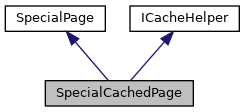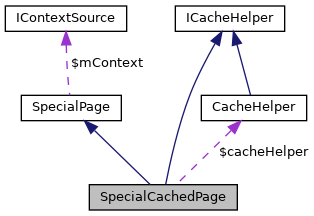

Public Member Functions | |
| addCachedHTML ( $computeFunction, $args=array(), $key=null) | |
| Add some HTML to be cached. More... | |
| getCachedValue ( $computeFunction, $args=array(), $key=null) | |
| Get a cached value if available or compute it if not and then cache it if possible. More... | |
| onCacheInitialized ( $hasCached) | |
| Gets called after the cache got initialized. More... | |
| saveCache () | |
| Saves the HTML to the cache in case it got recomputed. More... | |
| setCacheEnabled ( $cacheEnabled) | |
| Sets if the cache should be enabled or not. More... | |
| setExpiry ( $cacheExpiry) | |
| Sets the time to live for the cache, in seconds or a unix timestamp indicating the point of expiry. More... | |
| startCache ( $cacheExpiry=null, $cacheEnabled=null) | |
| Initializes the caching. More... | |
 Public Member Functions inherited from SpecialPage Public Member Functions inherited from SpecialPage | |
| __construct ( $name='', $restriction='', $listed=true, $function=false, $file='default', $includable=false) | |
| Default constructor for special pages Derivative classes should call this from their constructor Note that if the user does not have the required level, an error message will be displayed by the default execute() method, without the global function ever being called. More... | |
| checkPermissions () | |
| Checks if userCanExecute, and if not throws a PermissionsError. More... | |
| checkReadOnly () | |
| If the wiki is currently in readonly mode, throws a ReadOnlyError. More... | |
| displayRestrictionError () | |
| Output an error message telling the user what access level they have to have. More... | |
| execute ( $subPage) | |
| Default execute method Checks user permissions, calls the function given in mFunction. More... | |
| getContext () | |
| Gets the context this SpecialPage is executed in. More... | |
| getDescription () | |
| Returns the name that goes in the <h1> in the special page itself, and also the name that will be listed in Special:Specialpages. More... | |
| getFile () | |
| Get the file which will be included by SpecialPage::execute() if your extension is still stuck in the past and hasn't overridden the execute() method. More... | |
| getFinalGroupName () | |
| Get the group that the special page belongs in on Special:SpecialPage Use this method, instead of getGroupName to allow customization of the group name from the wiki side. More... | |
| getFullTitle () | |
| Return the full title, including $par. More... | |
| getLang () | |
| Shortcut to get user's language. More... | |
| getLanguage () | |
| Shortcut to get user's language. More... | |
| getLocalName () | |
| Get the localised name of the special page. More... | |
| getName () | |
| Get the name of this Special Page. More... | |
| getOutput () | |
| Get the OutputPage being used for this instance. More... | |
| getPageTitle ( $subpage=false) | |
| Get a self-referential title object. More... | |
| getRequest () | |
| Get the WebRequest being used for this instance. More... | |
| getRestriction () | |
| Get the permission that a user must have to execute this page. More... | |
| getSkin () | |
| Shortcut to get the skin being used for this instance. More... | |
| getTitle ( $subpage=false) | |
| Get a self-referential title object. More... | |
| getUser () | |
| Shortcut to get the User executing this instance. More... | |
| including ( $x=null) | |
| Whether the special page is being evaluated via transclusion. More... | |
| isCached () | |
| Is this page cached? Expensive pages are cached or disabled in miser mode. More... | |
| isExpensive () | |
| Is this page expensive (for some definition of expensive)? Expensive pages are disabled or cached in miser mode. More... | |
| isIncludable () | |
| Whether it's allowed to transclude the special page via {{Special:Foo/params}}. More... | |
| isListed () | |
| Whether this special page is listed in Special:SpecialPages. More... | |
| isRestricted () | |
| Can be overridden by subclasses with more complicated permissions schemes. More... | |
| listed ( $x=null) | |
| Get or set whether this special page is listed in Special:SpecialPages. More... | |
| msg () | |
| Wrapper around wfMessage that sets the current context. More... | |
| outputHeader ( $summaryMessageKey='') | |
| Outputs a summary message on top of special pages Per default the message key is the canonical name of the special page May be overridden, i.e. More... | |
| requireLogin ( $reasonMsg=null, $titleMsg=null) | |
| If the user is not logged in, throws UserNotLoggedIn error. More... | |
| run ( $subPage) | |
| Entry point. More... | |
| setContext ( $context) | |
| Sets the context this SpecialPage is executed in. More... | |
| setHeaders () | |
| Sets headers - this should be called from the execute() method of all derived classes! More... | |
| setListed ( $listed) | |
| Set whether this page is listed in Special:Specialpages, at run-time. More... | |
| userCanExecute (User $user) | |
| Checks if the given user (identified by an object) can execute this special page (as defined by $mRestriction). More... | |
Protected Member Functions | |
| afterExecute ( $subPage) | |
| Gets called after. More... | |
| getCacheKey () | |
| Returns the variables used to constructed the cache key in an array. More... | |
 Protected Member Functions inherited from SpecialPage Protected Member Functions inherited from SpecialPage | |
| addFeedLinks ( $params) | |
| Adds RSS/atom links. More... | |
| beforeExecute ( $subPage) | |
| Gets called before. More... | |
| getGroupName () | |
| Under which header this special page is listed in Special:SpecialPages See messages 'specialpages-group-*' for valid names This method defaults to group 'other'. More... | |
| getRobotPolicy () | |
| Return the robot policy. More... | |
Protected Attributes | |
| boolean | $cacheEnabled = true |
| If the cache is enabled or not. More... | |
| CacheHelper | $cacheHelper |
| CacheHelper object to which we forward the non-SpecialPage specific caching work. More... | |
 Protected Attributes inherited from SpecialPage Protected Attributes inherited from SpecialPage | |
| IContextSource | $mContext |
| Current request context. More... | |
| $mIncludable | |
| $mIncluding | |
| $mName | |
Additional Inherited Members | |
 Static Public Member Functions inherited from SpecialPage Static Public Member Functions inherited from SpecialPage | |
| static | getSafeTitleFor ( $name, $subpage=false) |
| Get a localised Title object for a page name with a possibly unvalidated subpage. More... | |
| static | getTitleFor ( $name, $subpage=false, $fragment='') |
| Get a localised Title object for a specified special page name. More... | |
Detailed Description
Definition at line 40 of file SpecialCachedPage.php.
Member Function Documentation
◆ addCachedHTML()
| SpecialCachedPage::addCachedHTML | ( | $computeFunction, | |
$args = array(), |
|||
$key = null |
|||
| ) |
Add some HTML to be cached.
This is done by providing a callback function that should return the HTML to be added. It will only be called if the item is not in the cache yet or when the cache has been invalidated.
- Since
- 1.20
- Parameters
-
callable $computeFunction array $args string | null $key
Definition at line 142 of file SpecialCachedPage.php.
References $args, and SpecialPage\getOutput().
◆ afterExecute()
|
protected |
Gets called after.
- See also
- SpecialPage::execute.
- Since
- 1.20
- Parameters
-
$subPage string|null
Reimplemented from SpecialPage.
Definition at line 64 of file SpecialCachedPage.php.
References saveCache().
◆ getCachedValue()
| SpecialCachedPage::getCachedValue | ( | $computeFunction, | |
$args = array(), |
|||
$key = null |
|||
| ) |
Get a cached value if available or compute it if not and then cache it if possible.
The provided $computeFunction is only called when the computation needs to happen and should return a result value. $args are arguments that will be passed to the compute function when called.
- Since
- 1.20
- Parameters
-
callable $computeFunction array | mixed $args string | null $key
- Returns
- mixed
Implements ICacheHelper.
Definition at line 126 of file SpecialCachedPage.php.
References $args.
◆ getCacheKey()
|
protected |
Returns the variables used to constructed the cache key in an array.
- Since
- 1.20
- Returns
- array
Definition at line 176 of file SpecialCachedPage.php.
References array(), and SpecialPage\getLanguage().
Referenced by startCache().
◆ onCacheInitialized()
| SpecialCachedPage::onCacheInitialized | ( | $hasCached | ) |
Gets called after the cache got initialized.
- Since
- 1.20
- Parameters
-
boolean $hasCached
Definition at line 190 of file SpecialCachedPage.php.
References SpecialPage\getOutput().
◆ saveCache()
| SpecialCachedPage::saveCache | ( | ) |
Saves the HTML to the cache in case it got recomputed.
Should be called after the last time anything is added via addCachedHTML.
- Since
- 1.20
Implements ICacheHelper.
Definition at line 152 of file SpecialCachedPage.php.
Referenced by afterExecute().
◆ setCacheEnabled()
| SpecialCachedPage::setCacheEnabled | ( | $cacheEnabled | ) |
Sets if the cache should be enabled or not.
- Since
- 1.20
- Parameters
-
boolean $cacheEnabled
Implements ICacheHelper.
Definition at line 76 of file SpecialCachedPage.php.
References $cacheEnabled.
◆ setExpiry()
| SpecialCachedPage::setExpiry | ( | $cacheExpiry | ) |
Sets the time to live for the cache, in seconds or a unix timestamp indicating the point of expiry.
- Since
- 1.20
- Parameters
-
integer $cacheExpiry
Implements ICacheHelper.
Definition at line 165 of file SpecialCachedPage.php.
◆ startCache()
| SpecialCachedPage::startCache | ( | $cacheExpiry = null, |
|
$cacheEnabled = null |
|||
| ) |
Initializes the caching.
Should be called before the first time anything is added via addCachedHTML.
- Since
- 1.20
- Parameters
-
integer | null $cacheExpiry Sets the cache expiry, either ttl in seconds or unix timestamp. boolean | null $cacheEnabled Sets if the cache should be enabled or not.
Implements ICacheHelper.
Definition at line 89 of file SpecialCachedPage.php.
References $cacheEnabled, array(), getCacheKey(), and SpecialPage\getRequest().
Member Data Documentation
◆ $cacheEnabled
If the cache is enabled or not.
- Since
- 1.20
Definition at line 55 of file SpecialCachedPage.php.
Referenced by setCacheEnabled(), and startCache().
◆ $cacheHelper
|
protected |
CacheHelper object to which we forward the non-SpecialPage specific caching work.
Initialized in startCache.
- Since
- 1.20
Definition at line 48 of file SpecialCachedPage.php.
The documentation for this class was generated from the following file:
- includes/specials/SpecialCachedPage.php
